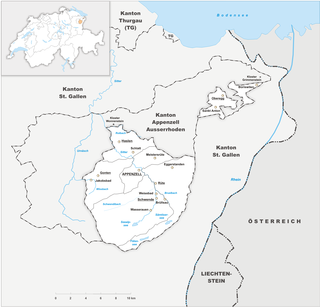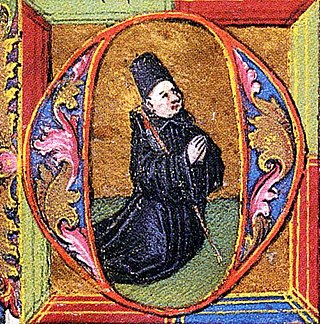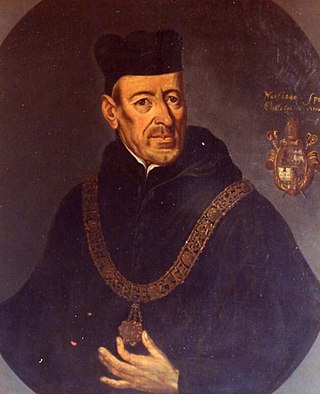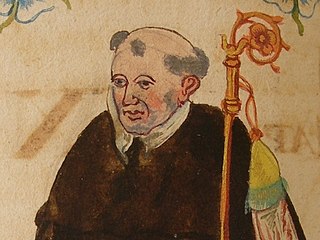
The Abbey of Saint Gall is a dissolved abbey (747–1805) in a Catholic religious complex in the city of St. Gallen in Switzerland. The Carolingian-era monastery existed from 719, founded by Saint Othmar on the spot where Saint Gall had erected his hermitage. It became an independent principality between 9th and 13th centuries, and was for many centuries one of the chief Benedictine abbeys in Europe. The library of the Abbey is one of the oldest monastic libraries in the world.

Appenzell Innerrhoden, in English sometimes Appenzell Inner-Rhodes, is one of the 26 cantons forming the Swiss Confederation. It is composed of five districts. The seat of the government and parliament is Appenzell. It is traditionally considered a "half-canton", the other half being Appenzell Ausserrhoden.

Appenzell Ausserrhoden, in English sometimes Appenzell Outer Rhodes, is one of the 26 cantons forming the Swiss Confederation. It is composed of twenty municipalities. The seat of the government and parliament is Herisau, and the seat of judicial authorities are in Trogen. It is traditionally considered a "half-canton", the other half being Appenzell Innerrhoden.

Appenzell was a canton in the northeast of Switzerland, and entirely surrounded by the canton of St. Gallen, in existence from 1403 to 1597.

Leopold III, known as the Just, a member of the House of Habsburg, was Duke of Austria from 1365. As head and progenitor of the Leopoldian line, he ruled over the Inner Austrian duchies of Carinthia, Styria and Carniola as well as the County of Tyrol and Further Austria from 1379 until his death.

The Appenzell Wars were a series of conflicts that lasted from 1401 until 1429 in the Appenzell region of modern-day Switzerland. The wars consisted of uprisings of cooperative groups, such as the farmers of Appenzell or the craftsmen of the city of St. Gallen, against the traditional medieval power structure represented by the House of Habsburg and the Prince-Abbot of the Abbey of St. Gall.
Kuno or KUNO may refer to:
Swantibor I, previously referred to by historians as Swantibor III was a member of the House of Griffin, a Duke of Pomerania-Stettin and for a while governor of the Mittelmark.

Robert Scipio, Freiherr von Lentulus was a military officer, first in Austrian service, later in Prussian service. He was among Frederick the Great's trusted officers, and served him not only in military capacity but as a diplomat and, later, a governor of Neuchâtel. He was proprietor of a Prussian cavalry regiment in the years 1758–1778.

Gozbert was abbot of the Abbey of Saint Gall from 816 until 837 and also abbot of Rheinau Abbey until 850. The beginning of his term of office in Rheinau is unknown.

Grimald, Latinised Grimaldus, was abbot of Weissenburg Abbey, abbot of the Abbey of Saint Gall (841–872), arch-chaplain of the East Frankish king Louis the German (848–870) and chancellor. He was one of the founders of scholarly education in the East Franconian Empire and in St. Gall.
Hartmut von St. Gallen was abbot of the Abbey of Saint Gall.
Heinrich von Gundelfingen was abbot of the Abbey of Saint Gall from 1411 to 1418 when he resigned. He was the grandfather of Heinrich von Gundelfingen.
Heinrich von Mansdorf was abbot of the Abbey of Saint Gall from 1419 to 1426.
Eglolf Blarer was abbot of the Abbey of Saint Gall from 1426 to 1442.
Georg von Wildenstein was abbot of the Abbey of Saint Gall from 1360 to 1379.
Kaspar von Breitenlandenberg was prince abbot of the Abbey of Saint Gall from 1442 to 1463. He descended from a noble family from the Canton of Thurgau. His father was Rudolf V von Breitenlandenberg (Landenberg).

Ulrich Rösch was abbot of the Abbey of Saint Gall from 1463 to 1491. He is considered one of the most outstanding abbots of the monastery.

Leodegar Bürgisser was abbot of the Abbey of Saint Gall from 1696 to 1717.

Wilhelm I Count of Montfort was prince-abbot of Saint Gall from 1281 until 1301.












